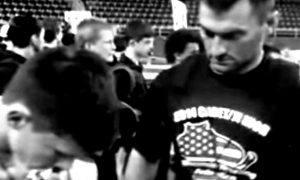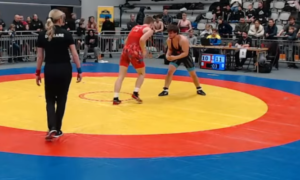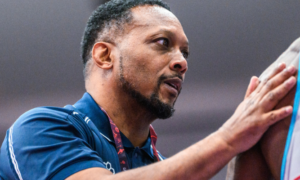It’s assumed that wrestling, specifically Greco Roman, requires an innate set of senses. Feeling the movements of the opponent, seeing hand and foot placement, and hearing instructions from the coach to better your position. However, a wrestling club based out of Woodbridge, VA has its own ideas.
Werewolves World Wresting, the baby of Gold-level coach Mark McGowan, hopes to prove that not all senses are necessary to become a champion. And as such, McGowan runs his 70-man roster somewhat differently than most coaches of his stature.
That’s due to the dynamics of the situation. Werewolves World Wrestling consists of three separate teams that all train together. There’s the Elite squad, which includes athletes of all ages with no disabilities hoping to make it to the next level. Then there is the Deaf team. These wrestlers train alongside the elites with the exception that of course, they can’t hear. Lastly, there is the “Challenge” team, a mixed group comprised of all ages and skill sets who have different types of physical and mental disabilities.
McGowan takes pride in running a club where everyone helps make each other better, as well as a place where anyone who wants to “come out and roll around” can indeed do so. “There’s a number of kids who are limited but through great things, wrestling brings out something in every single kid that you can see and feel,” McGowan insists.. “It’s an energy that is contagious. Once you see a kid go out there and roll around and he ends up doing something, that smile on his face. There’s no amount of money that can pay.”
Growing Pains
2009 was when McGowan first laid eyes on the team. “It interested me for the fact that USA Wrestling is always looking for ways to establish a grassroots program and this fit right in,” said McGowan. In 2012, McGowan was approached by the USA Deaf Sports Federation and the chairman of Deaf Wrestling. He was named head coach of the US Deaf Wrestling Organization later that year and took the team to Sophia, Bulgaria.
“At the time, the team had no format and was losing wrestlers because they weren’t getting any better,” McGowan explains. “The idea was to take the elite wrestlers and put them alongside the deaf wrestlers. So far, it’s worked out well.” McGowan also assures that the program is growing literally daily.“I’m getting calls. It’s a great thing to see happen.”
In fact, McGowan has had to be selective when recruiting people due to space limitations. Even still, he made it clear that it is their goal is to accept anyone. “We take anyone who has a desire. Their limitation is not something we concern ourselves with. Anybody can wrestle. If you think about it, it’s one of the first things little kids end up doing, they wrestle each other. It’s an innate thing in all of us,” McGowan said.
The team competed in the 2013 Deaf Olympics but according to McGowan, they’ve been “floundering” from that point on. Since the program’s inception, they haven’t had a single consistent facility to call home. On July 1st, Werewolves World Wrestling got the call and moved into Garfield High School as its new headquarters. The room has been completely overhauled and is now state of the art. “God bless those people for letting us in there. It’s the only one of its kind in US,” McGowan says proudly.
Participation Is Critical
The US Deaf Wrestling Organization now has kids coming from states all across the country, so upgrading to a stable environment was necessary. Because the team didn’t have a permanent training center till this month, his team won’t be making an appearance at Fargo. His next goal is preparing for the Deaf Olympics set for next year.
“We pride ourselves on being the little choo-choo that could. We’ve got a place, now the next step is getting a guy on the Olympic team. We need a crowned champion. It’s a lofty goal. We got to win a national championship and we got to have talent to do that. We need to build this up.”
In the beginning, Coach McGowan didn’t know any sign language. This meant a communication problem, but they’ve worked it out. Instead of a whistle, he uses a strobe light to get their attention.
“They’ve made it clear to me pretty quickly that deaf was not a disability. We’ve developed 15 to 20 wrestling signs. I had to go to plan B,C,D and so on to find something that worked.” He also came to a realization. “Eventually, I realized being deaf is a benefit. They can focus. They can wrestle at a tournament without worrying about looking at me. My job is to make sure they don’t get taken advantage of. I just let the ref know there’s a deaf athlete on the mat and try to keep my mouth shut. They might look at me periodically, especially if I’m throwing a brick in.”
McGowan also discussed how he wrestles with each guy in the room to make sure they picked up the technique correctly. “I have to know they’re doing it right. If there’s a correction, I can show them right there. Deaf wrestlers go by feel, which is why they are such good Greco wrestlers, because it’s a lot of feel.”

McGowan hopes to have his wrestlers competing in major Senior events by next year.
McGowan teaches all three types of wrestling, although he admits Greco is where his heart is.
“I’m a Greco guy. My first love is Greco, I want them to know how to throw. If you come to me and you’re good at a sweep single, etc, what I want to do is add something to your arsenal in the form of a throw. If they’ve got to worry about a throw, they’re gonna open up that original move. I want these guys to know how to throw because if you mess up, the chances of being in a dire situation are less because he’s a throw away from you,” McGowan said.
It would appear something amazing is happening in a small Virginia town, but it’s only just the beginning. McGowan believes if he can get his program up and soaring, it will be great for wrestling all around. The key is getting the public to accept it.
“It’s a matter of perception. When they’re wrestling, you don’t know that they’re deaf. You just go, ‘Holy guacamole, this kid can wrestle.’”
If you ask the coach, this is where the real work starts to take this program to the heights he believes it is capable of. But there’s a catch: Funding is vital to keep this program up and running. McGowan and some colleagues are starting a campaign called #MakeaAChampion. If you would like to donate, look for that when it launches later this summer.
One final thing is that McGowan wants the community to know he’s not out there for himself. After all, there are greater concerns at play. “This isn’t for me, it’s never been about me. It’s always about the kids. When there’s no more me, this program needs to still be standing. I want it to stand for what they deserve. All they need is a shot,” he urged.
“The generosity of other coaches have made this a possibility. I’m very grateful to everyone.”
If you’re interested in learning more about the US Deaf Wrestling Organization and its program, please contact:
Head Coach Mark McGowan
Email: coachmarkmcgowan@yahoo.com
Phone: (540) 318-9624












